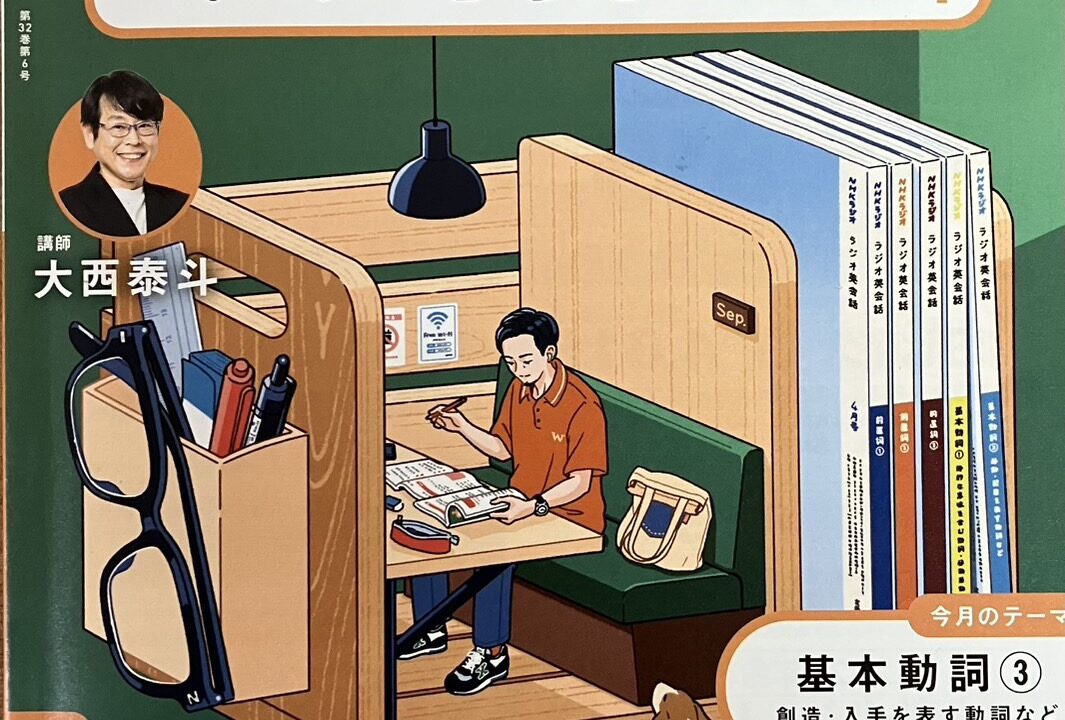【ラジオ英会話】Lesson 111 入手を表す動詞⑦ – getの「変化」 – September 15 Monday, 2025

September 15 Monday, 2025
Lesson 111 入手を表す動詞⑦ – get の「変化」
★Opening
O: Hum… Love is in the air, right?
D: Are you sure it’s love? And not just Kinmokusei?
O: What do you mean, Kinmokusei?
D: Uh, it’s… It’s that time of year, so…
☆Words & Phrases
Hi, Roxy. You’re wearing a jacket today. – Yes, it’s finally getting cooler. It‘s been so hot recently.
**prefer A to B:
I know. But I prefer hot weather to really cold weather.
**be born:
Where were you born, William?
**not in the slightest:
You look a little like John. – I do not. Not in the slightest.
☆Grammar and Vocabulary
ever
Have you ever been there?
この文の ever は「これまでに」と訳されるが、イメージは at any time (どの時点をとっても) で、特定の時点に縛られないことを表す表現
この文は、正確には「いつのことでもいいのですが、あなたはそこに行ったことはありますか?」ということ
(✖) I have ever been there. は不自然。「いつのことでもいいのですが、行ったことがあります」とは言えないため
説明型オーバーラッピング(SVC)
You look a little like John.
この文は、be動詞文を典型例とする「説明型」、主語の説明をする型
基本的には「You = a little like John」ということ
ただ、この文ではbe動詞ではなく、意味のある look が使われているため、その意味が文全体にオーバーラップする
You = a little like John (に見える)
となる
↓当ジムのコースと料金↓
https://businessenglishnagoya.work/%e5%bd%93%e3%82%b8%e3%83%a0%e3%81%ae%e3%82%b5%e3%83%bc%e3%83%93%e3%82%b9%e4%b8%80%e8%a6%a7/
☆Grasp the Concept
It’s finally getting cooler.
この例では、get の「動き」が「変化」の意味となっている
文型は「説明型オーバーラッピング(SVC)」
It = cooler [に is getting: なっている]
ということ
get は説明型で頻繁に使われる
①get + 形容詞に慣れる
He got angry.
「get+形容詞」は高頻度で使われる形
get thirsty
get tired
get dark
get sick
get nervous
「~になる」ということ
get busy
は、忙しくなるということ
②get started と get going
Let’s get started.
Let’s get going.
get started, get going は、単に「始める・出ていく」ではなく、そうしたプロセスに入るということ。始める・出ていくまでの準備が必要な場合に使う
started (始まった)・going (出ていっている) の状態に「なる」と変化が感じられている
③get 受動態
He got arrested for drunk driving.
get は受動態にも頻繁に使われる
be動詞よりも口語的で、出来事が「起こる」動的な感触がある
He was arrested ~ が「逮捕された」という事実を述べているのに対し、
He got arrested ~ は、突然・予期せぬ出来事が「起こった」に焦点がある
☆Practical Usage
・get going
・get busy
「行く準備できた?道路が混む前に本当に出発したいんだ。ほら、前回のことを覚えているでしょ?4時間以上も渋滞にはまっちゃったじゃない」
☆Pronunciation Polish
D: All right everyone! It’s time for today’s pronunciation polish. Let’s jump right in with today’s phrase,
Have you ever been there?
All right. Today’s question is super high frequency. So, let’s master it. So you can use it in your everyday conversation. First up is “have.” The “h” sound will disappear. Let’s try,
– (h)ave
Very nice. Next up, the long /uː/ sound in “you.” Let’s shorten that “a,”
– y(ou)
Put them together,
– (h)ave y(ou)
All right. Next up, the “been there”. The “n” sound and /ð/ sound will combine,
– bee(nth)ere
All right. Let’s put it together. Slowly at first and then speed up,
– (H)ave y(ou) ever bee(nth)ere?
All right. And a little more natural,
– (H)ave y(ou) ever bee(nth)ere?
All right. Because this is high frequency, you’ll hear native speaker say this very quickly. “Have you ever been there?” You don’t have to master that speed just yet, but let’s get used to it. Great work today.
★Ending
O: Hey guys. When you get stuck in traffic, what do you do in the car?
D: Honestly, it’s time to crank up the music and practice my karaoke.
O: How about you, Roza?
R: Well, I mean, I do that regularly even when there is no traffic. So it’s the same for me.
D: What about you, sensei? What do you do?
(O: あーぼくですか。ぼくは、前の車のナンバーをいろいろ組み合わせて、足し算とか引き算とかを、作りますね)
D: I do that, too!!!
O: Oh, really?
D: Yeah, like, the left side minus the right side. Yeah! I play that like it too.
September 15 Monday, 2025
Lesson 111 入手を表す動詞⑦ – get の「変化」
(日本語訳・解説付き)
★Opening
O: Hum… “Love is in the air,” right?
うーん「恋の予感が漂っている」ね?
D: Are you sure it’s love? And not just Kinmokusei?
それ、本当に恋?ただのキンモクセイの香りじゃなくて?
O: What do you mean, Kinmokusei?
キンモクセイって何?どういうことよ笑?
D: Uh, it’s… It’s that time of year, so…
あー、その…今ちょうどそういう季節だからさ…
☆Words & Phrases
Hi, Roxy. You’re wearing a jacket today. – Yes, it’s finally getting cooler. It‘s been so hot recently.
やぁ、ロキシー。今日は上着を着ているんだね – ええ、やっと涼しくなってきたので。最近まで、とても暑かったです。
※It’s been ~ は「過去から現在に向かって」という動きが感じられる表現。現在完了の典型的な表現です!
**prefer A to B: BよりもAを好む
I know. But I prefer hot weather to really cold weather.
そうだね。でも、僕は、とても寒い天気よりは暑い天気のほうがいいな。
※prefer A to B の文は、まず「prefer hot weather = 暑い天気をより好んでいる」とまず言い切ること。それから「何よりも好んでいるのか?」を toで指して「to really cold weather」と言うこと。考え方は単純です!
**be born: 生まれる
Where were you born, William?
ウィリアムさん、あなたはどこで生まれたんですか?
**not in the slightest: 少しも〜でない
You look a little like John. – I do not. Not in the slightest.
あなたは少しジョンに似ていますね – 似ていないよ。ちっとも。
※slight は「かすかな」という形容詞です
☆Grammar and Vocabulary
ever
Have you ever been there?
あなたは、これまでそこに行ったことはありますか?
この文の ever は「これまでに」と訳されるが、イメージは at any time (どの時点をとっても) で、特定の時点に縛られないことを表す表現
この文は、正確には「いつのことでもいいのですが、あなたはそこに行ったことはありますか?」ということ
(✖) I have ever been there. は不自然。「いつのことでもいいのですが、行ったことがあります」とは言えないため
説明型オーバーラッピング(SVC)
You look a little like John.
あなたは少しジョンに似ています。
この文は、be動詞文を典型例とする「説明型」、主語の説明をする型
基本的には「You = a little like John」ということ
ただ、この文ではbe動詞ではなく、意味のある look が使われているため、その意味が文全体にオーバーラップする
You = a little like John (に見える)
となる
↓当ジムのコースと料金↓
https://businessenglishnagoya.work/%e5%bd%93%e3%82%b8%e3%83%a0%e3%81%ae%e3%82%b5%e3%83%bc%e3%83%93%e3%82%b9%e4%b8%80%e8%a6%a7/
☆Grasp the Concept
It’s finally getting cooler.
ようやく涼しくなってきています。
この例では、get の「動き」が「変化」の意味となっている
文型は「説明型オーバーラッピング(SVC)」
It = cooler [に is getting: なっている]
ということ
get は説明型で頻繁に使われる
①get + 形容詞に慣れる
He got angry.
彼は怒りました。
「get+形容詞」は高頻度で使われる形
get thirsty (喉が渇く)
get tired (疲れる)
get dark (暗くなる)
get sick (病気になる)
get nervous (緊張する)
「~になる」ということ
get busy(仕事を始める・[道路などが] 混雑する)
は、忙しくなるということ
②get started と get going
Let’s get started.
Let’s get going.
そろそろ行こうよ。
get started, get going は、単に「始める・出ていく」ではなく、そうしたプロセスに入るということ。始める・出ていくまでの準備が必要な場合に使う
started (始まった)・going (出ていっている) の状態に「なる」と変化が感じられている
③get 受動態
He got arrested for drunk driving.
彼は飲酒運転で逮捕されました。
get は受動態にも頻繁に使われる
be動詞よりも口語的で、出来事が「起こる」動的な感触がある
He was arrested ~ が「逮捕された」という事実を述べているのに対し、
He got arrested ~ は、突然・予期せぬ出来事が「起こった」に焦点がある
☆Practical Usage
・get going
・get busy
「行く準備できた?道路が混む前に本当に出発したいんだ。ほら、前回のことを覚えているでしょ?4時間以上も渋滞にはまっちゃったじゃない」
【解答例】
Are you ready to go? I really want to get going before the roads get busy. You remember last time, don’t you? We got stuck in traffic for over four hours.
・ready to ~ は「~する準備ができた」to の矢印 (→) のイメージが「これから」のニュアンスとつながっている
・get stuck は「巻き込まれる」。stuck は動詞 stick (くっつける・行き詰まらせる) の過去分詞からの形容詞。get stuck でまとめて覚えておく
☆Pronunciation Polish
D: All right everyone! It’s time for today’s pronunciation polish. Let’s jump right in with today’s phrase,
Have you ever been there?
All right. Today’s question is super high frequency. So, let’s master it. So you can use it in your everyday conversation. First up is “have.” The “h” sound will disappear. Let’s try,
– (h)ave
Very nice. Next up, the long /uː/ sound in “you.” Let’s shorten that “a,”
– y(ou)
Put them together,
– (h)ave y(ou)
All right. Next up, the “been there”. The “n” sound and /ð/ sound will combine,
– bee(nth)ere
All right. Let’s put it together. Slowly at first and then speed up,
– (H)ave y(ou) ever bee(nth)ere?
All right. And a little more natural,
– (H)ave y(ou) ever bee(nth)ere?
All right. Because this is high frequency, you’ll hear native speaker say this very quickly. “Have you ever been there?” You don’t have to master that speed just yet, but let’s get used to it. Great work today.
★Ending
O: Hey guys. When you get stuck in traffic, what do you do in the car?
ねえみんな、渋滞にはまったときって、車の中で何してる?
D: Honestly, it’s time to crank up the music and practice my karaoke.
正直言うと、音楽をガンガンかけてカラオケの練習してる。
O: How about you, Roza?
ローザはどう?
R: Well, I mean, I do that regularly even when there is no traffic. So it’s the same for me.
うーん、私、それは普段から渋滞じゃなくてもやってるから、変わらないかな。
D: What about you, sensei? What do you do?
先生は?何してるの?
(O: あーぼくですか。ぼくは、前の車のナンバーをいろいろ組み合わせて、足し算とか引き算とかを、作りますね)
D: I do that, too!!!
それ、僕もやる!!!
O: Oh, really?
え、ほんとに?
D: Yeah, like, the left side minus the right side. Yeah! I play that like it too.
うん、やるやる!例えば「左の数字から右の数字を引く」とか。そんな感じで遊んでるよ!
★LINE公式のお友だち登録はこちら
毎週『ラジオ英会話』を深堀した、使える英語情報を発信しています♪
名古屋駅前【AI×英会話】名古屋BEGビジネス英会話ジム – AIで鍛えるビジネスで使える英語力。仕事も日常も、一歩先へ。
営業時間:平日 9:00~21:00 土曜日 9:00~19:00(日祝休み)
〒450-0002 愛知県名古屋市中村区名駅2丁目40-16 名駅野村ビル 5階


